e-OTI/OnTheInternet Archives
All articles from e-OTI are available from the archives. Selected articles from previously-issued
printed editions are also available. Complete printed back issues
are available from the ISOC Store.
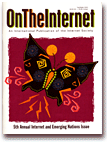 |
|
November/December 2000
Can the Internet Be Used to Bridge Inequalities in Medical Information
Access?
e-OTI’s Madanmohan Rao talks with WebMD Foundation’s George Gellert
about using the Internet to revolutionize health care.
ITU Brings Telemedicine to Uganda
The ITU is helping Uganda harness the latest information technology
for a truly tangible humanitarian cause.
African Experience with Telecenters
By Peter Benjamin
Can telecenters help bring the information age to Africa? Different
initiatives are examined to help determine the most effective
model for sustainability.
|
|
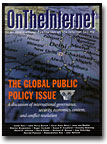 |
|
September/October 2000
Access to the Web: The Cost of Connecting
By David Maher
The Internet Society's VP for Public Policy examines new information
and trends concerning the cost of online access worldwide.
Distance Education: An Oxymoron?
By Carol Twigg
The Chronicle of Higher Education published a review of a new book, The Social Life of Information. The authors believe that proponents of IT suffer from "tunnel
vision" that prevents them from seeing that learning is a social
experience for which distance-education technology is a poor substitute.
Can the Internet Be Used to Bridge Inequalities in Medical Information
Access?
e-OTI’s Madanmohan Rao talks with WebMD Foundation’s George Gellert
about using the Internet to revolutionize health care via improvements
in the way physicians, consumers, and health care institutions
interact.
ITU Brings Telemedicine to Uganda
The ITU is helping Uganda harness the latest information technology
for a truly tangible humanitarian cause.
African Experience with Telecenters
By Peter Benjamin
Can telecenters help bring the information age to Africa? Different
initiatives are examined to help determine what combination of
government, private sector, international donor, and community
-organization projects would serve as the most effective model
for sustainability.
Censorship 2000
By John Perry Barlow
How will we be affected by the increasingly diverse and inventive
forces of online censorship? And who will win? The Party of the
Past or the Party of the Future?
The Internet Society and Public Policy
By David Maher
The Internet Society has identified five public policy issues
it believes are most critical. The next step is to develop and
formulate positions that reflect a wide range of voices and opinions.
Struggling with the Digital Divide
By Madanmohan Rao
The Internet can exacerbate the digital divide. But it can also
be used to narrow the gap.
Local Access Pricing and the International Digital Divide
By Sam Paltridge
Access to information and communications resources is increasingly
critical to economic and social development. But not all countries
can access resources equally. Can favorable pricing structures
create equity?
The Internet Policy Paradox: Less is More
By Charles Brownstein
When it comes to public policy, more regulation is not necessarily
better regulation. Instead, the best hope for Internet policy
may be to mirror the design of the Internet itself.
Toward a Global E-Commerce Clause
By Susan P. Crawford and David R. Johnson
In today's interconnected global economy, we need rules for online
merchants that are consistent around the world.
How Can We Ensure the Privacy of Internet Users?
By Harriet Pearson
As Web use increases, so do the number and variety of privacy
issues. What are the best ways to address the growing concerns
over privacy?
The International Internet Interconnection Issue
By Jane van Beelen and John Rolland
Many ISPs believe that connection costs aren't distributed equitably
among nations. Who's really paying for international Internet
traffic?
Ensuring a Truly Global Policy-Making Process
By Izumi Aizu
The Internet is transforming economics and societies worldwide.
What will it take to create a working system of Internet governance?
Trademarks and Domain Names: The New Remedies
By Carol Anne Been and David W. Maher
The end of 1999 saw the creation of two new methods for resolving
domain-name disputes-the U.S Anticybersquatting Consumer Protection
Act and ICANN's Uniform Domain Name Dispute Resolution Policy.
They may be better than you think.
Security: Protecting the Internet from Cyber Attacks
By Dorothy Denning
Walking the fine line that separates protection from intrusion.
Internet Domain Names
By Roger Cochetti
What role should the private sector have in domain-name management?
|
|
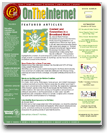 |
|
July/August 2000
Content and Connection in a Broadband World
By Jeanne Marie Follman
Broadband access to the Internet is finally becoming available
in our neighborhood. When we sign up for it, we will have Internet
access that is high speed and always on. That will be great. But
what will happen when the younger members of the household go
online using their favorite software?...This question highlights
the problem of combining both content and connection into a single
product—a practice known as bundling—as we move into a world of
broadband access to the Internet.
Vint Cerf Speaks at UN Information Technology Conference
Vinton G. Cerf, Senior Vice President for Internet Architecture
and Technology, WorldCom, and former president of the Internet
Society, recently addressed the ECOSOC Information Technology
Conference at the United Nations in New York.
Build a Dot Corps, Not just a Dot Com
Madanmohan Rao Interviews George Colony, CEO, Forrester Research
George Colony is the founder and CEO of Massachusetts-based Forrester
Research, a leading Internet market research firm. Forrester is
now 17 years old and has a presence in more than 15 countries.
Colony has 19 years of experience as an analyst and is widely
quoted in the international business press.
New Rules for a New Economy
Madanmohan Rao reviews Building Wealth: The New Rules for Individuals, Companies and
Nations in a Knowledge-Based Economy
Looking for a sweeping overview of emerging economic trends as
well as a road map for success in the new economy? Try Building Wealth, by Lester Thurow, renowned MIT economist and author of other
best-sellers like The Zero-Sum Society and The Future of Capitalism.
The Asian Steel Industry Can Benefit Significantly from the Internet
Madanmohan Rao interviews Andrew Yao, founder and CEO of Hong
Kong–based iSteelAsia.com
iSteelAsia.com is an online market exchange for the Asian steel
industry. He is chairman of construction materials distributor
Van Shung Chong Holdings and was formerly a strategic consultant
at Matsushita Electric in Tokyo.
Networthy - August 2000
|
|
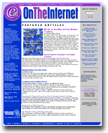 |
|
May/June 2000
Words on the Web and the Written Tradition
By Jeanne Marie Follman
In e-mails, chat rooms, Web pages, news groups, and instant messages,
countless words fly across the Internet every day; the written
word hasn’t seen such a boost since the invention of printing.
But despite the newness of the medium, words on the Web fit very
snugly into the history of the written tradition. We have been
storing our thoughts in various forms of writing for about five
or six thousand years. In each case—as with telephones and computers—there
is a sender, a signal, and a receiver. The point is the communication
of a message.
Cyberliability: New Exposures to Old Risks
By Russell Beck
As Web and e-mail usage skyrocket in the workplace, so does the
potential for Internet-related misconduct and lawsuits. What should
employers look out for, and what can they do to protect themselves?
Russell Beck discusses the growing variety of cyberliability claims.
Education: Guidelines for Computer-Based Testing
By James B. Olsen
Computers are now standard and pervasive tools that significantly
affect our daily lives. In testing and assessment applications,
they have changed the ways in which tests and assessments are
developed and administered.
Networthy - June 2000
|
|
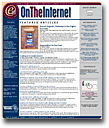 |
|
April 2000
Search Engines: Gateways to the Digital Economy
Mandanmohan Rao reports from the Search Engine Summit in New York
As entry points to the largest explosion of information the human
race has ever seen, Web directories and search engines are increasingly
being seen as key gateways to the Internet economy. And new technological
innovations, business models, and stupendous investments are being
poured into this industry.
Internet Treasures: Christon Bacon
By Hope Hill
Thirteen-year-old Christon Bacon has spent most of his young life
isolated in urban poverty, but with the Internet he has thrived.
Learn more about Christon in the first of a new series of profiles
-- ISOC Internet Treasures.
|
|
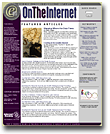 |
|
March 2000
Mapping Where the Data Flows
By Martin Dodge
When I type the Internet Society's Web address into my browser,
the HTML and graphics are seamlessly downloaded and the page displayed
within a couple of seconds. But by what route does this information
travel to reach me? Using a traceroute tool reveals this and much
more.
Creating an Accessible Internet
By Mary Barros-Bailey
The Internet as a source of information is growing at a rate almost
beyond comprehension. It is without question the greatest and
most accessible collection of resources in history. And though
it is widely accepted that navigating the seemingly endless resources
contained on the Internet offers unprecedented opportunities,
many throughout the world are unable to benefit.
Designing for a Digital Economy
By Nevin Cohen
E-commerce offers architects a unique opportunity—perhaps even
a professional responsibility—to create bold schemes for a rapidly
changing environment.
The Graying of the Internet
By Marcie Parker, Ph.D., CFLE
Demographic changes throughout the world have the potential to
fundamentally alter the way we view healthcare.
India’s IT Bill Follows the UNCITRAL’s Model Law on E-Commerce
By Madanmohan Rao
Madanmohan Rao interviews legal consultant Shakeel Kudrolli concerning
recent developments in cyberlaw and related issues.
Online Learning Costs More . . . or Does It?
By Carol A. Twigg
Carol Twigg examines facts behind the common perception that distance
learning is more costly than traditional classroom instruction.
The Internet in Chile: 1999 Was a Good Year
By Irit Askira Gelman
After a slowdown in 1997 and 1998, in 1999 the Internet in Chile
experienced outstanding expansion. Find out how 1999 became that
country's year of Internet growth.
Broadband for Regional Survival and Growth: Background and First
Steps
By Lars Hornborg
The problem: bringing broadband Internet access to Sweden. The
solution? Leave it to the market. But in sparsely-populated rural
areas, that isn't always the answer. The first article in a three-part
series explores how a group of entrepreneurs got around that obstacle
to bring broadband to the people.
The Story of Mirador: A Search Engine for Latin America
As far as search engines go, Yahoo! is great for some areas of
the world. But sometimes-just as in politics-being local is the
key. For some people in Latin America, this was precisely the
way to go.
Common Ground - March 2000
Happy Trails to Trialing Hyphens - Kidlink Makes a Small World
After All - Wiring Sri Lankan Schools
Networthy - March 2000
|
|







